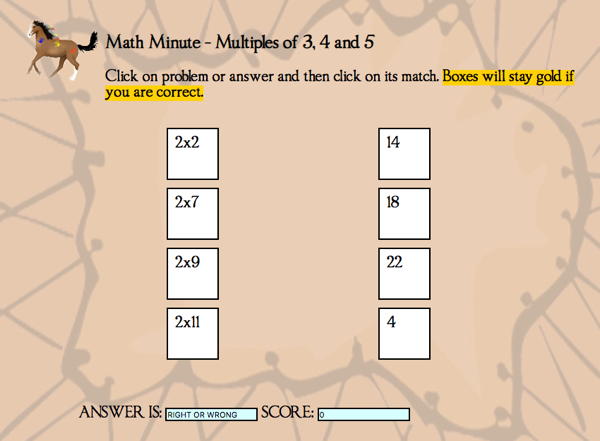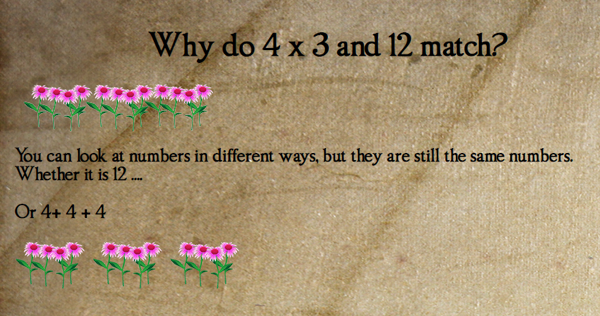You’ll never convince me that multiplication tables are unnecessary
If it hasn’t happened after over 30 years of teaching math, it’s probably not going to happen. Yes, we all have calculators on our phones. Before that we had calculators on our watches (anyone remember that?). You know what is faster than pulling out your phone and typing in 9×6? Knowing the answer is 54.
It isn’t at all a new idea that
Geary (1994)
It’s a lot easier to solve (9 x 6) = 2y +8 if you can see that it’s 54 – 8 = 2y
If you have fluency with math facts, you really see the 9 x6 and 54 as the same thing. One less complication in the problem. Now, I, as the teacher, can explain that you can subtract an 8 from both sides to get 2y isolated on one side of the equation. Divide both sides by 2 and there’s your answer.

That’s why we emphasize multiplication over and over in our two most popular games, Spirit Lake and Making Camp (you can get free demo versions here). There are matching quizzes, like the one above. There is a memory game with multiplication problems and answers. There is an option to just type in a number and have a table generated. There are pages that explain multiplication, like the one below.

As I said last week, when most of you were probably still on vacation, there are a surprising number of options in our free demo. All of my experience has just confirmed over and over that students need a lot of exposure to math in a variety of examples. There are word problems in the virtual world. There are are practice problems, quizzes, games. The student who gets the problems in the virtual world correct won’t see these. This is as it should be.
I was that kid in school bored out of my mind while we went over the multiplication tables again and again
If a student already knows the material, he or she should be allowed to progress ahead. Sometimes that means a student plays through a game in 45 minutes (not usually, that’s the record for Fish Lake) because the student excelled at the game parts and got all the math questions right. Great! Let that student go on to the next game.
A teacher told me that the problems were too difficult for the students so he told them the answers. Don’t.
For the students who don’t know the answers, that’s why the extra learning activities are there. Let the students do these and if they still can’t answer the question and fail again, they can try another learning activity. If they get the problem wrong again, try another learning module and then try the problem again.
This is how kids play games. They play the same level over and over until they win.
Spirit Lake offers multiple ways to learn multiplication, and you can get our Spirit Lake Demo , as well as several other free games here. Since Spirit Lake only runs on Mac and Windows at the moment, I added some links there for iPad and Chromebook games as well.
